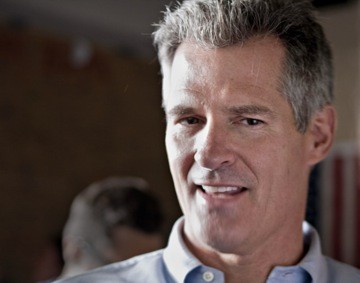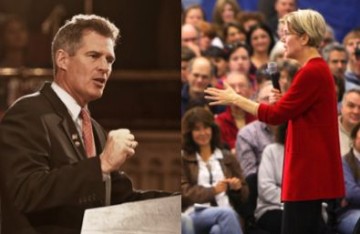Central Mass Will Decide The US Senate Race
Tuesday, March 06, 2012

US Senator Scott Brown
The state’s broad middle is seen as a crucial swing region by both campaigns, with the potential to make the difference between who wins and who loses this fall in a race that could help tip the balance of power in the bitterly divided U.S. Senate.
For Warren, the challenge will be making inroads in a region that has been trending increasingly towards Republican candidates in recent years after reliably voting for the late Sen. Edward Kennedy during his decades in office.
Brown faces his own challenges, having to hang onto newly won turf during a general election year in which President Obama is likely to bring out Democratic voters who might otherwise have stayed home.
“Outside of the White House, this will be the best watched race in the country,” said former state Treasurer Tim Cahill, who ran for governor in 2010.
“In my mind, Central Mass will be key,” Cahill said. “It will be the battleground.”
Ground zero for epic senate contest
As the two candidates fight for every vote in what is expected to be a tight, hard fought election, the nearly 100 or so towns and cities between I-495 and Palmer are likely to be some of the most hotly contested in the state.
Warren can count on traditionally liberal areas like Boston and Suffolk County, as well as the Berkshires in the west. Brown, by contrast, outpolled Warren by a big margin outside of Boston on the north and south shores, in a recent Western New England University poll.
But Worcester County and Central Massachusetts remains contested territory, the swing vote in in the statewide senate battle, said Cahill and other political observers.

Could be the 2nd most important race in US
In fact, both candidates are showing they recognize the region’s importance in their actions, with Brown kicking off his reelection campaign in Worcester and Brown making frequent campaign stops in the city and other area communities.
Warren has already made two appearances in Worcester, meeting with business owners and elected officials. She has also put together a network of more than 1,700 volunteers, according to a spokeswoman.
Spending on the race is expected to shatter records as well, with estimates ranging from $30 million to as much as $60 million. Through December 31, 2011 (the latest FEC reporting date) Brown has more than $12 million in cash on hand. Warren has more than $6.1 million. There are seven other Democrats who have established federal campaigns for the Senate seat.
“The fact that Scott Brown did his announcement in Worcester tells you everything you need to know about the area’s importance,” said Edward Augustus, a former state senator from Worcester and GoLocalWorcester MINDSETTER™.
Battling for the “blue collar suburbs”
Warren can expect to take Worcester, a traditional Democratic stronghold, and possibly Fitchburg and Leominster as well. But Worcester is increasingly a blue dot in a sea of red, with the small towns and suburbs that surround it having increasingly voted for Brown and other Republican candidates over the past few years.
Brown took Worcester County during the 2010 special senate election by a margin of 62-38 percent.
In another show of conservative strength, Republican Lewis Evangelidis, a former state rep, won election as Worcester County Sheriff.
“A lot of towns in Worcester County have been trending Republican,” Augustus said.
That stands in contrast to the late Sen. Edward Kennedy’s personal hold over the region, having defeated three Republican challengers by wide margins, including Mitt Romney in 1994. Kennedy won 54 percent of the Worcester County vote in 1994, 69.1 percent in 2000, and 64.8 percent in 2006.
For her part, Warren can’t simply rely on spurring big Democratic turnouts in Worcester and other urban areas, while writing off the suburbs as Brown country, political observers say. According to the WNEU poll released Sunday, Brown leads Warren 46% to 40% in Central Mass with 14% undecided (please note a small sampling size).
A long line of failed Democratic candidates failed to carry Worcester County after falling short in the suburbs, including John Silber, Shannon O’Brien and most recently, Martha Coakley, when she lost to Brown.

Reagan Democrats could decide it
Warren’s best bet will be to focus on “blue collar suburbs” where voters may at least be more open to her economic message, including Milford, Millbury, Auburn, and Webster, Glodis said. Overall, she will need to win over some of the so-called “Reagan Democrats” that have crossed party lines in recent decades to put Republican candidates into office, Cahill notes. She doesn’t need to outright win towns as much as making the final tally more competitive, he contends.
Can Warren do it?
But whether Warren can successfully win over socially conservative, blue collar voters remains to be seen. Christopher Pinto, vice chairman of the Worcester Republican City Committee, contends Warren will be a tough sell in small towns across Worcester County. He’s eager to have voters see Warren and President Obama in the same frame, believing the fall will produce a backlash against the president that will turn the tide against Warren as well. While acknowledging she’s a much tougher candidate than Martha Coakley was, Pinto contends Warren’s background as a Harvard professor will make it difficult for her to connect with everyday voters wary of escalating government spending and taxes.
“I think Scott Brown will benefit from the anti-Obama sentiment,” Pinto said. “The Democrats are not so excited about Obama anymore and Lizzie Warren will suffer.”
But former Democratic Congressman Bill Delahunt contends Obama and the general election could provide a crucial boost to Warren’s chances.
Brown won in a special election, which, despite high turnout, has different dynamics. A general election is likely to bring out more voters, especially Democratic ones, as the party’s big city machines get revved up, Delahunt contends.
And Warren has shown herself to be an able campaigner, able to transcend her background to connect with voters from all walks of life.

Elizabeth Warren
Despite her emphasis on boosting the middle class, Warren may find herself struggling to get past her background as a highly paid Harvard professor – who pulled down $350,000 a year - as she attempts to connect with working class voters.
“This is an opportunity for Scott Brown, with his pickup truck, to represent himself as more empathetic to their concerns,” Schaefer said.
A spokesman for Brown’s campaign could not be reach for contact.
But Alethea Harney, a spokeswoman for Warren’s campaign, argued that Central Mass is a “top focus” for the campaign.
“We are going town by town, ward by ward to connect with voters,” she said. Harney said, "Elizabeth has been fighting hard for middle class families and to hold Wall Street accountable. She knows that working families in Central Massachusetts and across the Commonwealth are concerned about jobs and getting our economy moving again. She is focused on taking on the big banks and special interests to make Washington work for the middle class."




 Delivered Free Every
Delivered Free Every
Follow us on Pinterest Google + Facebook Twitter See It Read It